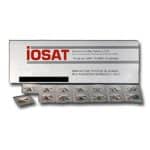Last Updated on 2 years by Christopher G Mendla
The Oyster Creek Nuclear plant in New Jersey just announced an “Unusual Event” due to extremely low tides. The engineers reacted quickly and professionally and reduced power until the situation was back to normal.
However, this does highlight the importance of being prepared for a nuclear emergency. Potassium Iodide and Potassium Iodate provide some specific protection in the event of a nuclear event. Iodine will NOT protect you from massive radiation or fallout. It will however, provide some protection.
After World War II, scientists noticed that American Servicemen who participated in the early nuclear tests were developing thyroid cancer. However, the rate of similar cancers among Japanese survivors at Nagasaki and Hiroshima was much lower. They determined that the Japanese diet that included seaweed might mean that their thyroids were already saturated with iodine. The thyroid cancers occurred because radioactive isotopes of Iodine were being absorbed by the thyroid.
DISCLAIMER, you should check with your physician to ensure that there is no serious risk to taking Potassium Iodide or Iodate.
The idea is that if an accident or attack is pending or has occured, taking enough Iodine to saturate the thyroid would help prevent the absorption of radioactive iodine.
From the CDC statement on Potassium Iodide:
It is important to take the iodine before exposure to radioactive iodine.
KI (potassium iodide) does not keep radioactive iodine from entering the body and cannot reverse the health effects caused by radioactive iodine once the thyroid is damaged.
- KI (potassium iodide) only protects the thyroid, not other parts of the body, from radioactive iodine.
Here is how it works:
The thyroid gland cannot tell the difference between stable and radioactive iodine. It will absorb both.
KI (potassium iodide) blocks radioactive iodine from entering the thyroid. When a person takes KI, the stable iodine in the medicine gets absorbed by the thyroid. Because KI contains so much stable iodine, the thyroid gland becomes “full” and cannot absorb any more iodine—either stable or radioactive—for the next 24 hours.
Check the CDC for current dosage recommendations. Here is the recommendation as of Jan 2018 for a daily dose.
How is KI (potassium iodide) given?
The FDA has approved two different forms of KI (potassium iodide), tablets and liquid, that people can take by mouth after a radiation emergency involving radioactive iodine.
Tablets come in two strengths, 130 milligram (mg) and 65 mg. The tablets have lines on them so that they may be cut into smaller pieces for lower doses.
For the oral liquid solution, each milliliter (mL) contains 65 mg of KI (potassium iodide).
According to the FDA, the following doses are appropriate to take after internal contamination with (or likely internal contamination with) radioactive iodine: (WARNING – Check the FDA site for the latest, most accurate information)
- Newborns from birth to 1 month of age should be given 16 mg (¼ of a 65 mg tablet or ¼ mL of solution). This dose is for both nursing and non-nursing newborn infants.
- Infants and children between 1 month and 3 years of age should take 32 mg (½ of a 65 mg tablet OR ½ mL of solution). This dose is for both nursing and non-nursing infants and children.
- Children between 3 and 18 years of age should take 65 mg (one 65 mg tablet OR 1 mL of solution). Children who are adult size (greater than or equal to 150 pounds) should take the full adult dose, regardless of their age.
- Adults should take 130 mg (one 130 mg tablet OR two 65 mg tablets OR two mL of solution).
- W
omen who are breastfeeding should take the adult dose of 130 mg.
In Summary:
- Determine if Iodine is compatible with your health.
- Purchase Iodine BEFORE an emergency. Keep it in locations such as your home, office and vehicles.
- Familiarize yourself with other protective measures such as shutting down HVAC, masks, clothing etc.
- Familiarize yourself with the dosages.
- There is some discussion as to the advantages of potassium iodate over potassium iodide
- The shelf life is extremely long.
- Check the strength of any tablets you order.
Further Reading:


